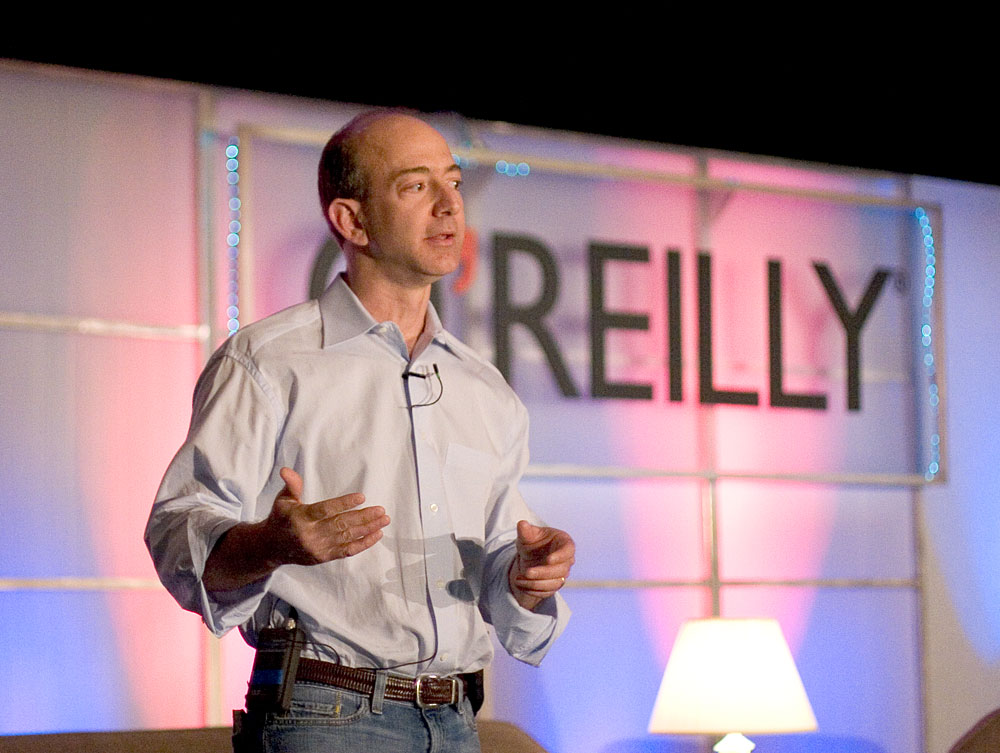[Photograph: Jeff Bezos, CEO of Amazon by James Duncan Davidson under Creative Commons]
There are several trends that will define the 21st century. A dominant one will be an enterprise strategy to be proactive. The admired enterprises of today do not wait for trouble to raise their ugly heads; they pick up issues at a nascent stage and proactively take actions to ensure that trouble does not arise at all. As a result, the cost incurred in rectifying any problem is smaller and the damage is limited. And such companies go one step further to win customer loyalty by anticipating their needs.
Such companies go one step further to win customer loyalty by anticipating their needs
Take e-tailers. They use predictive algorithms that take into account your past behaviour, browsing and search history, actual purchases and wish list history to predict your future purchase behaviour. By taking on board these data points, the algorithm knows more about your behaviour than you yourself know. Powered by this algorithm, they are able to personalize every page, every recommendation for each one of us.
Watch a video of this episode or continue reading
Episode 8: The new rules of business
Amazon.com implements this strategy successfully by offering personalized recommendations under multiple headings whenever you visit the site: News for you, Recommended for you, Inspired by your shopping trend.
Should you miss such a big hint, it shifts its assault from you to "people like you", and presents you with a short list of what people like you bought. This catches our attention because we want to know what other people like us are buying. Do we not keep up with the Joneses? In addition, when we are reassured that people like us are buying it, it de-risks the buying decision. This is referred to as 'social proof', a phenomenon where people get reassured when they feel that many customers do the same, believing that if so many people are doing it, all of them cannot be wrong.
If even this big hint is ignored, Amazon introduces urgency by sharing with us what other customers are looking at right now.
Every one of these initiatives proactively undertaken by the company has the potential to generate greater business.
These strategies deployed by Amazon and its ilk are based on behavioural economics:
Fear of Regret: It is a form of social anxiety where we fear missing out on an opportunity presented to us. To calm this anxiety we tend to behave irrationally.
Conformity Bias: We tend to behave by taking cues from others' behaviours rather than using our own judgment. This bias also makes us behave irrationally.
Amazon is now going a step further with "anticipatory shopping". Based on your purchase history and wish list, it starts shipping items that you are likely to purchase in future to its warehousing hub closest to your delivery address. If you do happen to order the items it has anticipated, they will reach you faster.
Through these proactive steps, Amazon seeks to amaze you by providing lightning quick service. In case you do not place an order, the item remains as inventory in the warehouse close to you awaiting your order. If, over a period of time, you do not order the item, the Smart Anticipatory Algorithm will move it closer to another customer whose demand for that item is being anticipated.
Amazon has extended this proactive strategy to its employees too. In April 2014, it launched a Pay to Quit offer to its employees who are dissatisfied or disgruntled or merely hanging on for the next pay cheque.
Amazon;s CEO Jeff Bezos explained the offer in his annual letter to shareholders: "The headline on the offer is 'Please Don’t Take This Offer.' We hope they don't take the offer; we want them to stay. Why do we make this offer? The goal is to encourage folks to take a moment and think about what they really want. In the long-run, an employee staying somewhere they don’t want to be isn’t healthy for the employee or the company."
But underlining the offer is the hope that those who are unhappy and, therefore, a drag on the company will leave and the brand will have only those who are committed to assisting Amazon deliver on its mission: "to be Earth’s most customer-centric company".
From Amazon, let us visit IKEA, arguably the world’s largest furniture retailer.
IKEA designs Do It Yourself (DIY) furniture, appliances and home accessories. In addition, the firm is known to keep an eagle eye on cost and, according to a Harvard Business School case study, has been successful in keeping its price lower by an average of 30 - 50% over its competitors.
How does it do it? By proactively ensuring that every element that impacts cost is kept in control. For instance, there are few staff in its stores. But before a customer can become frustrated at not finding a salesperson to help her, IKEA proactively announces over the public address systems in the stores that customers may find fewer salespersons because of cost-cutting and that the benefit of this is being passed on to her. The "evidence" is in the amazingly competitive price tags of IKEA products which are displayed prominently.
Now let me check you into Ritz-Carlton.
Ritz-Carlton also uses proactive strategy—not to convert dissatisfied guests into satisfied ones, but to ensure through its service that satisfied guests turn into delighted guests and go on to become life-long brand advocates.
Every staff member of Ritz-Carlton is entrusted with $2,000 to spend at their discretion on every guest, per incident, without seeking approval from higher authorities.
This cool strategy is not based on the assumption that there could be a problem and the $2,000 will help resolve it quickly. Instead, the strategy wishes to proactively empower the employee to make an already satisfied and happy guest delighted.
How does this strategy play out? If an employee discovers it is a guest's birthday, a cake is placed in the room. Or if a guest is waiting for a taxi and it is taking inordinately long, a complementary hotel car is made available for a drop, without the guest asking for it. The list is as endless as the employee’s imagination to anticipate unsaid desires of guests. In the process, the hotel helps its employees deliver on its promise of the Ritz-Carlton experience: "...enlivens the senses, instills well-being, and fulfills even the unexpressed wishes and needs of our guests".
Surprisingly, this initiative does not cost the hotel too much. It displays that Ritz-Carlton trusts its employees to exercise their good judgment and discretion to ensure that the sterling reputation of the hotel is not only upheld, but enhanced. By pursuing this proactive strategy, Ritz-Carlton is attempting to ensure that its guests are not merely satisfied and happy with their stay at the hotel but are absolutely and completely delighted and convert them into brand advocates for life.
From the world of Amazon, IKEA and Ritz-Carlton, let us step into the world of scandals—and enterprise are increasingly being confronted with it.
When a scandal breaks, forensic audits are conducted to gather evidence to identify the culprits and bring them to book. But this strategy is reactive and kicks in only once the horses have bolted from the stable.
Progressive enterprises do not wait for scandals to hit them and besmirch their good name; they take corrective actions even before the event has happened.
Progressive enterprises do not wait for scandals to hit, they take corrective actions before the event has happened
How can you take action even before an event has happened? No, they are not exactly taking inspiration from Steven Spielberg’s Minority Report, where Precrime, a specialized police department, apprehends criminals based on foreknowledge provided by psychic precognition. Instead, commercial organizations are counting on the power of Big Data analysis. This super intelligent software seeks to gather data from unrelated and widely dispersed sources to establish correlations between people, places, events and time. It tries to identify and establish intention and flags them off for further probing by humans.
To do this, Big Data seeks to trawl through every bit of data generated in a company and in the outside world. For instance, it picks up a trend where an employee, say a marketing person, has started emailing another employee—an internal auditor, maybe—with whom she may not have any reason to be in touch with during the normal course of business. Once this deepening relation is identified by Big Data, humans enter the picture to probe whether there is any nefarious intention. If they do discover an unholy alliance to, perhaps, defraud the company, proactive steps can be taken to nip this partnership in the bud and prevent a potential scam.
Companies that embrace proactive strategies enjoy numerous advantages. A partial list includes:
- Deepening the relationship with their customers and converting them into brand advocates.
- Ensuring ties with customers do not sour, and are repaired promptly in the unlikely event that they occur, incurring the least dissonance and cost possible.
- Undertaking improvements before circumstances force them to change.
- First-mover advantage over competition by seizing opportunities before others can spot them.
Go ahead and embrace this winning strategy and experience the benefits flowing your way.
If you have any questions mail us at askrajesh@foundingfuel.com
[An abridged version of this column was concurrently published in Mint]

